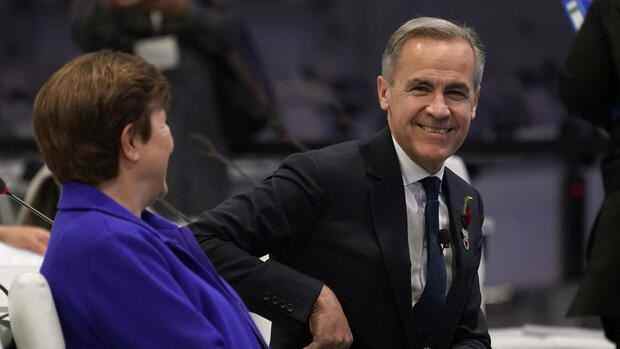The former head of the central bank is now mobilizing the financial sector for climate protection.
(Photo: AP)
London Deutsche Bank and climate protection – that was recently a sensitive topic for CEO Christian Sewing. The fund subsidiary DWS is accused of greenwashing in the marketing of its ESG funds, the financial supervisory authorities in Germany and the USA are examining the company for possible investor deception.
At the world climate conference in Glasgow, however, the Deutsche Bank boss unswervingly promoted his green agenda. “We have to put sustainability at the center of everything we do,” said Sewing at an event on the sidelines of the conference. They are working on making Deutsche Bank a prime example “to have credibility in public discussion”.
The banks have a crucial role in the fight against climate change, said Sewing. Because infrastructure and energy projects required large initial investments. Bank loans and public subsidies, however, were insufficient in view of the enormous financing requirements. That is why the capital markets are crucial for the success of the green restructuring.
After the appeals by the heads of government on the first two days of the climate conference, the financial sector came to the fore on Wednesday. The heads of banks, asset managers and insurers from London, New York, Frankfurt and other financial centers traveled to “Finance Day” to present their contribution to climate protection.
Top jobs of the day
Find the best jobs now and
be notified by email.
The most important announcement came from the Glasgow Financial Alliance for Net Zero (GFANZ). 450 of the world’s largest financial firms have pledged to use a total of $ 130 trillion of their managed capital in an increasingly climate-neutral way. The banks and asset managers involved manage 40 percent of global financial assets.
Shift gradually up to 2050
This capital is to be gradually shifted by 2050 – from dirty industries such as oil, gas and coal to renewable energies, energy-efficient houses, e-mobility and other climate-friendly activities.
Just a few years ago, most representatives of the financial industry would have thought the climate was a problem for others, said Mark Carney, the UN’s special envoy for climate protection and finance. Now the largest companies have agreed to “rigorous” targets and controls in order to achieve climate neutrality by 2050.
Carney, the former head of the British central bank, founded the GFANZ alliance in April and collected climate commitments from financial firms. Now he was satisfied with the result: “The money is there when the world wants it.”
London is to become the first climate-neutral financial center
The British Finance Minister Rishi Sunak did not want to stand back and in his opening address he confirmed that he wanted to make London the first “net zero financial center” in the world. From 2023, all companies listed on the London Stock Exchange should have a net zero strategy. This must show how the company wants to become climate neutral by 2050 and what specific steps it is taking to achieve this. In order to prevent greenwashing, a working group made up of business representatives, experts and supervisors is to develop uniform standards.
Climate activists, however, complain that there is a huge gap between the rhetoric and the actions of the financial sector. For years, activists have been protesting against the financing of fossil fuels at every general meeting of the bank – usually in vain.
Since the 2015 Paris Climate Agreement, banks have organized $ 4 trillion in fossil fuel capital around the world, according to Bloomberg financial service. That year alone, there were $ 460 billion in bonds and credits for oil, gas, and coal.
Promises should be treated with caution
According to a study by the think tank New Financial, ten times as much is still invested in dirty industries as in those that aim to protect the climate. Also, only a third of companies worldwide have a net zero strategy. After all, in Europe it is already half.
With this in mind, the promise of $ 130 trillion should be treated with caution. A large part of this capital is currently invested in activities that are harmful to the climate. And there are doubts as to how quickly the money will be reallocated. Because there are no binding guidelines, only voluntary commitments. Investor demand for ESG products is likely to be a deciding factor here.
Another key question is the definition of which investment is considered sustainable and which is not. As long as companies are allowed to set the criteria themselves, the industry’s credibility is in question.
The International Sustainability Standard Board (ISSB) is now to develop globally applicable standards for corporate sustainability reporting. The leadership of the new body will be based in Frankfurt, as the International Financial Reporting Standards Foundation announced on Wednesday.
More: Success for Frankfurt in the competition for the business with sustainability.
